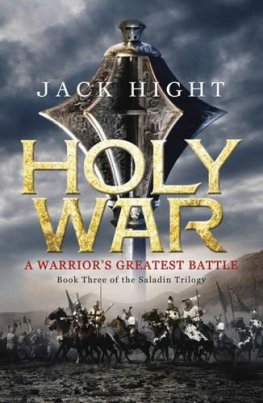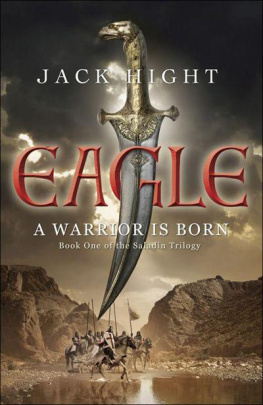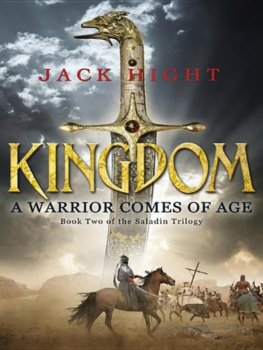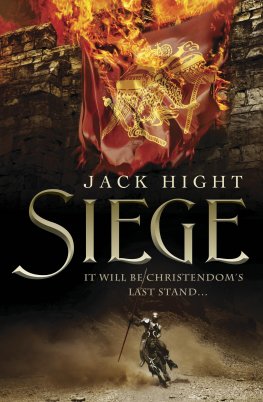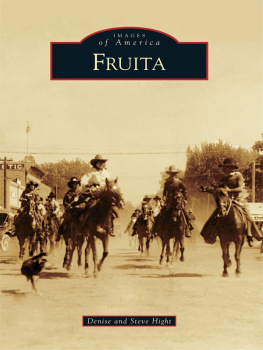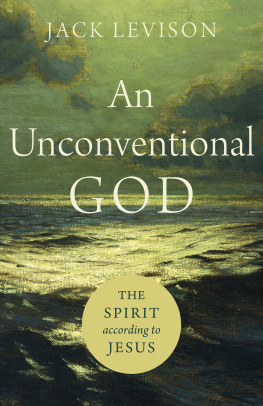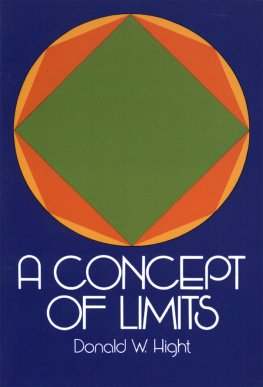Jack Hight - Holy War
Here you can read online Jack Hight - Holy War full text of the book (entire story) in english for free. Download pdf and epub, get meaning, cover and reviews about this ebook. year: 2013, publisher: John Murray, genre: Adventure. Description of the work, (preface) as well as reviews are available. Best literature library LitArk.com created for fans of good reading and offers a wide selection of genres:
Romance novel
Science fiction
Adventure
Detective
Science
History
Home and family
Prose
Art
Politics
Computer
Non-fiction
Religion
Business
Children
Humor
Choose a favorite category and find really read worthwhile books. Enjoy immersion in the world of imagination, feel the emotions of the characters or learn something new for yourself, make an fascinating discovery.
- Book:Holy War
- Author:
- Publisher:John Murray
- Genre:
- Year:2013
- ISBN:9781848545342
- Rating:3 / 5
- Favourites:Add to favourites
- Your mark:
- 60
- 1
- 2
- 3
- 4
- 5
Holy War: summary, description and annotation
We offer to read an annotation, description, summary or preface (depends on what the author of the book "Holy War" wrote himself). If you haven't found the necessary information about the book — write in the comments, we will try to find it.
Holy War — read online for free the complete book (whole text) full work
Below is the text of the book, divided by pages. System saving the place of the last page read, allows you to conveniently read the book "Holy War" online for free, without having to search again every time where you left off. Put a bookmark, and you can go to the page where you finished reading at any time.
Font size:
Interval:
Bookmark:
Jack Hight
Holy War
Part I
I was not with Saladin in the years following Montgisard, and I thank God for that. I had known him since he was a boy, but the man he became after his defeat was strange to me. He had vowed to take Jerusalem, and he set about his task with a ruthless energy that was frightful to behold, even at a distance. He unified his people as never before, forging competing emirs and enemy tribes into a single, dangerous weapon.
In Jerusalem, the king and his courtiers knew little enough of this. All they knew was that Saladin had turned his attention elsewhere, and that for the first time in many years there was peace. But they wasted it in vain squabbling for the throne, and when finally they saw the approaching danger, it was too late. .
The Chronicle of Yahya al-DimashqiChapter 1
December 1181: Cairo
Yusuf tugged his panther-skin cloak more tightly about him. The chill wind from the north brought with it a stinging rain and the sound of distant masons hammers. The winter weather had not stopped construction on the citadel rising on the hills south of Cairo; nor would it prevent Yusufs monthly inspection of his troops. The pennants that rose above the ranks of the army hung wet and limp, but the men beneath them sat straight in their saddles, despite the rain that soaked their caftans and beaded on their burnished mail.
You have done well, Yusuf told his younger brother. It had been Selims task to rebuild the army after the disaster at Montgisard. Four years ago, Yusufs army had marched to within a few miles of Jerusalem before being surprised and routed by the Christians. Yusuf had lost thousands of men. Afterwards, he had given his brother five years to rebuild the army. Selim had done it in four. The army before them was fifteen thousand men strong, larger than it had been before Montgisard. You have earned yourself a new name, brother: Saif ad-Din.
Shukran Allah. Selim bowed in the saddle. Sword of Islam. It is a good name.
Yusuf spurred forward to inspect the ranks. He rode past the mushtarawat: four thousand mounted men, all wearing saffron-yellow caftans over their mail to distinguish them as his personal troops. Each man carried a light bamboo spear in one hand and a small round shield in the other. Curved bows were slung over their backs and swords hung from their sides. The rain pinged off their steel helmets. They were Yusufs most skilled warriors, and among them were some of his oldest friends. He nodded as he passed Husam, with his gold tooth, and Nazam, a bald-headed, lean man, quick as a snake. Yusuf acknowledged several other men, but it was the absences that struck him. The peerless archers Liaqat and Uwais and the giant Qadir had all fallen at Montgisard.
Beyond his yellow-clad warriors were his brothers mamluks and those of the emir Qaraqush. Some of them wore jawshan vests composed of hundreds of tiny steel plates sewn together. Others wore mail or padded cotton lined with steel plates. Next came the five thousand men of the light cavalry, all in padded vests and with only bows and light spears for arms. Last of all, Yusuf rode through the ranks of the infantry. The five thousand men carried tall shields and long spears, which would allow them to turn aside a cavalry charge.
When he had ridden past the final row, Yusuf turned his horse and cantered back to the front of the army. Are there any cases for me to hear? he asked Qaraqush.
The stout emir with the grizzled beard nodded. Prisoners! he shouted, and the guards herded forward three men. Yusuf was disappointed to see that one of them was his cousin, Nasir ad-Din. It was not the first time that the young man been brought before him. Nasir ad-Din had been a boy of only seven when his father Shirkuh died. He had been raised at the palace in Cairo, and had become fast friends with Yusufs nephew, Ubadah. Yusuf had given his cousin Homs to rule, hoping that commanding others might teach him discipline, but Nasir ad-Din had not yet set foot in his lands. He preferred to stay in Cairo while he enjoyed the revenues from Homs. Qaraqush pointed to him. Nasir ad-Din was found drunk in the barracks with two women. One of them was married.
Nasir ad-Din was thin as a stalk of wheat, and like a stalk of wheat he was trembling, though more likely from fear or shame than the cold wind. His eyes were fixed on the ground at Yusufs feet.
Look at me, Cousin, Yusuf commanded. Explain yourself.
II meant no harm, Nasir ad-Din began. He spoke haltingly at first, and then the words came out in a rush. Three of my men reached their eighteenth year this last month. They were freed and became full mamluks. A leader must share his mens joys as well as their pains. My father taught me that. I took them to Chandras to celebrate. I fear I became quite drunk.
And the married woman? Who was she?
She never told me her name, Malik. She never told me she was married, either. I swear it! I-
Enough. There was a time when Yusuf might have forgiven his cousins indiscretions. After all, he too had once slept with another mans wife. But Yusuf had been a different man then, before Montgisard, before the desert. You have disgraced yourself and our family with your drunkenness and lewd actions, he said sternly. There are few crimes more heinous than to sleep with another mans wife, and to do so in public, in the barracks amongst your men. . Yusuf shook his head. You will suffer ten blows from the lash, and you will pay a hundred dinars to the man you have wronged. As of tomorrow, you are banished from Cairo. Go to your lands in Homs and learn to rule justly and wisely. I pray for your sake that I do not hear further ill tidings of you.
Nasir ad-Din opened his mouth to protest, then thought better of it. Yes, Malik.
The next man to be brought forward was bald, with a fat face. His sodden caftan was plastered over a round belly. Shaad is a cook, Qaraqush declared. He has been found guilty of thievery.
Malik, I never! I have been a cook for twenty years and more. I served your uncle, Shirkuh. I-
Yusuf drew his sword and the cook fell silent. What did he steal?
Each month, he kept some of the money intended to buy food for the troops.
Shaad fell to his knees on the muddy ground. It was only the once, Malik. I swear it. Have mercy!
Yusuf dismounted. You have grown fat on food that was intended for your fellow soldiers. You shall lose your post and suffer a thiefs punishment. He gestured to the guards, who grabbed the cook from behind. One of them stretched out his right arm. Another took a strip of cloth and tied it tightly just below the elbow, to staunch the flow of the blood that was to come. As Yusuf raised his sword, the cook thrashed and squirmed. I will have your hand, Yusuf told him. Hold still if you want a clean cut. Shaad ceased resisting, and Yusuf brought his sword down. The cook fainted, and the guards dragged him away, leaving his severed hand on the parade ground. Yusufs gut burned, but he hardly noticed. It was always burning of late.
He returned to the saddle as the final prisoner was brought forward. The man was very handsome, with a trimmed black beard and golden eyes. What did this one do?
Rape, Malik. A glass merchants daughter.
There are witnesses?
Qaraqush gestured to four men in silk caftans. With them was a woman wearing a niqab that hid all but her eyes. Four men, as required by law, Malik.
The prisoner met Yusufs eye without flinching. It was no rape. She wanted it, Malik.
He lies! one of the men in silk shouted. Look what he did to my daughter, Malik. The woman removed her niqab. Her cheek was bruised, her lip split and bloodied. He has disgraced her. What sort of bride price will I find for her now?
The mamluk will be stoned to death as decreed by law, Yusuf declared. You shall be compensated for your loss. A hundred dinars.
Font size:
Interval:
Bookmark:
Similar books «Holy War»
Look at similar books to Holy War. We have selected literature similar in name and meaning in the hope of providing readers with more options to find new, interesting, not yet read works.
Discussion, reviews of the book Holy War and just readers' own opinions. Leave your comments, write what you think about the work, its meaning or the main characters. Specify what exactly you liked and what you didn't like, and why you think so.

